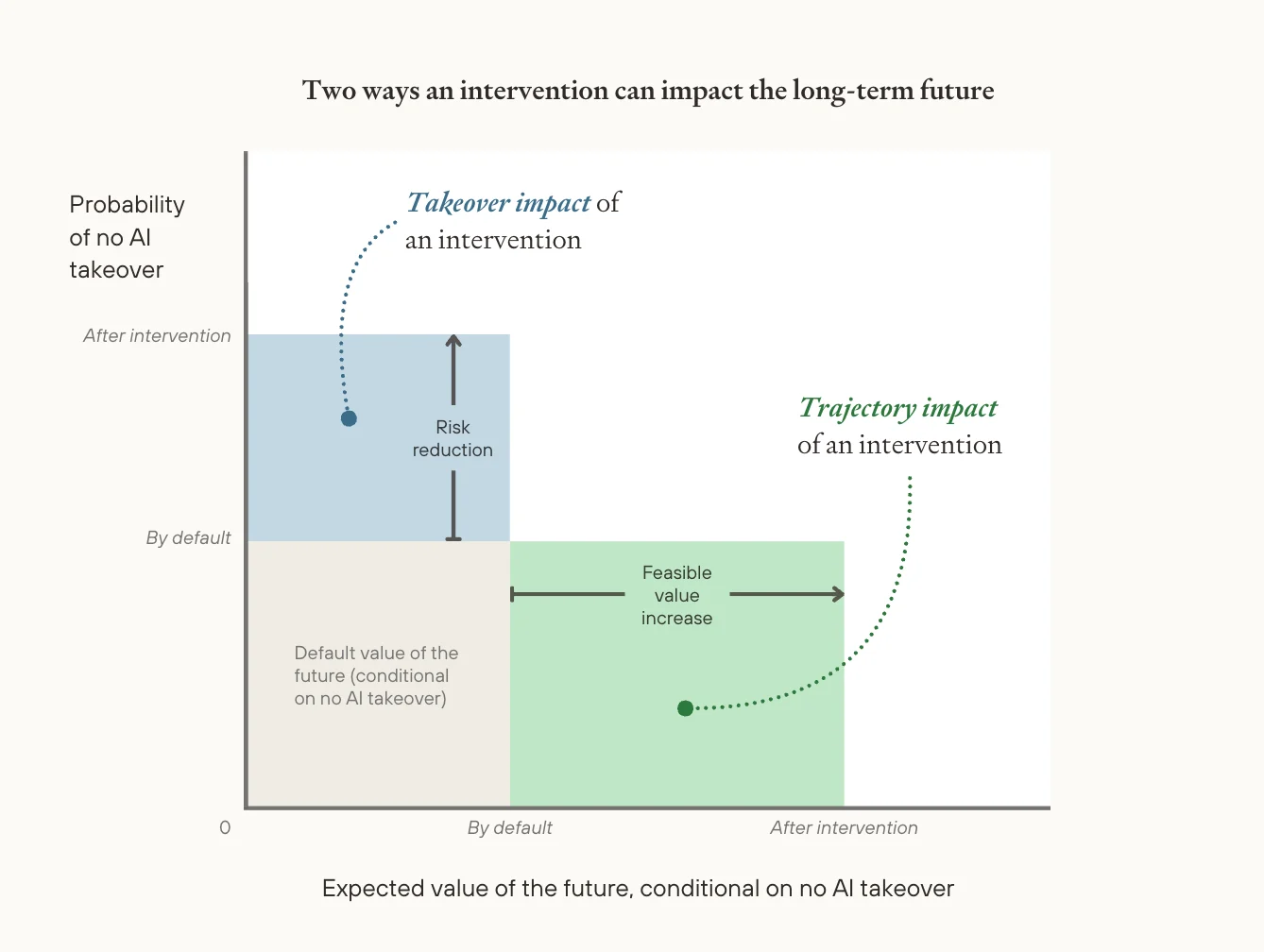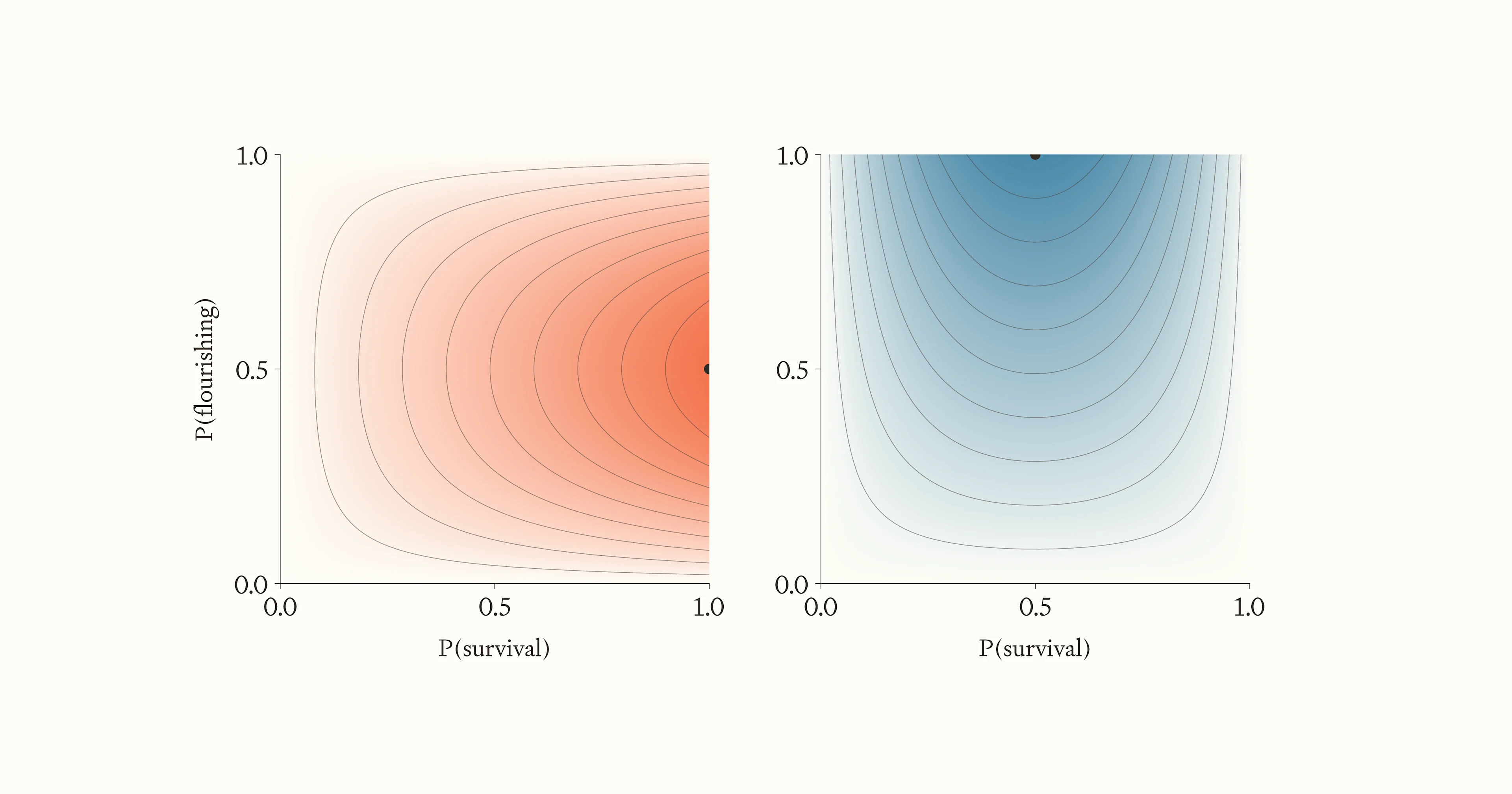Our research
How should we navigate explosive AI progress?
Featured
Preparing for the Intelligence Explosion
William MacAskill & Fin Moorhouse
March 2025
AI that can accelerate research could drive a century of technological progress over just a few years. During such a period, new technological or political developments will raise consequential and hard-to-reverse decisions, in rapid succession. We call these developments grand challenges.
These challenges include new weapons of mass destruction, AI-enabled autocracies, races to grab offworld resources, and digital beings worthy of moral consideration, as well as opportunities to dramatically improve quality of life and collective decision-making.
We argue that these challenges cannot always be delegated to future AI systems, and suggest things we can do today to meaningfully improve our prospects. AGI preparedness is therefore not just about ensuring that advanced AI systems are aligned: we should be preparing, now, for the disorienting range of developments an intelligence explosion would bring.
AI-Enabled Coups: How a Small Group Could Use AI to Seize Power
Tom Davidson, Lukas Finnveden & Rose Hadshar
April 2025
The development of AI that is more broadly capable than humans will create a new and serious threat: AI-enabled coups. An AI-enabled coup could be staged by a very small group, or just a single person, and could occur even in established democracies. Sufficiently advanced AI will introduce three novel dynamics that significantly increase coup risk. Firstly, military and government leaders could fully replace human personnel with AI systems that are singularly loyal to them, eliminating the need to gain human supporters for a coup. Secondly, leaders of AI projects could deliberately build AI systems that are secretly loyal to them, for example fully autonomous military robots that pass security tests but later execute a coup when deployed in military settings. Thirdly, senior officials within AI projects or the government could gain exclusive access to superhuman capabilities in weapons development, strategic planning, persuasion, and cyber offense, and use these to increase their power until they can stage a coup. To address these risks, AI projects should design and enforce rules against AI misuse, audit systems for secret loyalties, and share frontier AI systems with multiple stakeholders. Governments should establish principles for government use of advanced AI, increase oversight of frontier AI projects, and procure AI for critical systems from multiple independent providers.
Better Futures
Series
William MacAskill
August 2025
Suppose we want the future to go better. What should we do?
One approach is to avoid near-term catastrophes, like human extinction. This essay series explores a different, complementary, approach: improving on futures where we survive, to achieve a truly great future.
Will AI R&D Automation Cause a Software Intelligence Explosion?
Daniel Eth & Tom Davidson
March 2025
AI companies are increasingly using AI systems to accelerate AI research and development. Today’s AI systems help researchers write code, analyze research papers, and generate training data. Future systems could be significantly more capable – potentially automating the entire AI development cycle from formulating research questions and designing experiments to implementing, testing, and refining new AI systems. We argue that such systems could trigger a runaway feedback loop in which they quickly develop more advanced AI, which itself speeds up the development of even more advanced AI, resulting in extremely fast AI progress, even without the need for additional computer chips. Empirical evidence on the rate at which AI research efforts improve AI algorithms suggests that this positive feedback loop could overcome diminishing returns to continued AI research efforts. We evaluate two additional bottlenecks to rapid progress: training AI systems from scratch takes months, and improving AI algorithms often requires computationally expensive experiments. However, we find that there are possible workarounds that could enable a runaway feedback loop nonetheless.
AI Tools for Existential Security
Lizka Vaintrob & Owen Cotton-Barratt
March 2025
Humanity is not prepared for the AI-driven challenges we face. But the right AI tools could help us to anticipate and work together to meet these challenges — if they’re available in time. We can and should accelerate these tools.
Key applications include (1) epistemic tools, which improve human judgement; (2) coordination tools, which help diverse groups work identify and work towards shared goals; (3) risk-targeted tools to address specific challenges.
We can accelerate important tools by investing in task-relevant data, lowering adoption barriers, and securing compute for key R&D. While background AI progress limits potential gains, even small speedups could be decisive.
This is a priority area. There is lots to do already, and there will quickly be more. We should get started, and we should plan for a world with abundant cognition.
Stay up to date with our research
Stay up to speed with the latest research on preparing for transformative AI. Roughly weekly.
By subscribing you agree to Substack's terms of service. Unsubscribe anytime. Archives.
Research
Filter
(57)
Design sketches: tools for strategic awareness
Owen Cotton-Barratt, Lizka Vaintrob, Oly Sourbut & Rose Hadshar
Part 3 of Design sketches for a more sensible world

Abstract
Near-term AI could be used to power technologies that give individuals and organizations a deeper strategic awareness of the world around them, helping them spot opportunities and avoid pitfalls as they make plans. We think improved strategic awareness could be especially important for empowering humanity to handle the challenges that advanced AI is likely to bring. Here we sketch three technologies that build towards this vision.
Authors
Owen Cotton-Barratt, Lizka Vaintrob, Oly Sourbut & Rose Hadshar
Topic
Macrostrategy
Design sketches for a more sensible world
Series
Owen Cotton-Barratt, Lizka Vaintrob, Oly Sourbut & Rose Hadshar

Abstract
We think that near-term AI systems could transform our ability to reason and coordinate, significantly improving our chances of safely navigating the transition to advanced AI systems. This sequence gives a series of design sketches for specific technologies that we think could help. We hope that these sketches make a more sensible world easier to envision, and inspire people to start building the relevant tech.
Authors
Owen Cotton-Barratt, Lizka Vaintrob, Oly Sourbut & Rose Hadshar
Topic
Modelling AI progress
Design Sketches: Angels-on-the-Shoulder
Owen Cotton-Barratt, Lizka Vaintrob, Oly Sourbut & Rose Hadshar
Part 2 of Design sketches for a more sensible world

Abstract
Near-term AI could allow us to build many technological analogues to ‘angels-on-the-shoulder’: highly customized tools that help people to better navigate their environments or handle tricky situations in ways they’ll feel good about later. These could mean more endorsed decisions, and fewer unforced errors. Here we sketch five technologies that build towards this vision.
Authors
Owen Cotton-Barratt, Lizka Vaintrob, Oly Sourbut & Rose Hadshar
Topic
Macrostrategy
The International AGI Project Series
Series
William MacAskill

Abstract
This is a series of papers and research notes on the idea that AGI should be developed as part of an international collaboration between governments. We aim to (i) assess how desirable an international AGI project is; (ii) assess what the best version of an international AGI project (taking feasibility into account) would look like.
Author
William MacAskill
Topic
International governance
What an international project to develop AGI should look like
William MacAskill
Part 1 of The international AGI project series

Abstract
What would the best version of an international project to develop AGI look like? In this research note, I set out my tentative best guess: “Intelsat for AGI”. This would be a US-led international project modelled on Intelsat (an international project that set up the first global communications satellite network), with broad benefit sharing for non-members. The primary case is that, within the domain of international AGI projects, this looks unusually feasible, and yet it would significantly reduce catastrophic risk compared to a US-only project.
Author
William MacAskill
Topic
International governance
AGI and World Government
William MacAskill & Rose Hadshar
Part 3 of The international AGI project series

Abstract
If there’s a large enough intelligence explosion, the first project to build AGI could organically become a de facto world government. In this note, we consider what implications this possibility has for AGI governance. We argue that this scenario makes it more desirable that AGI be developed by a multilateral coalition of democratic governments, under explicitly interim governance arrangements, and that non-participating countries receive major benefits and credible reassurances around their sovereignty.
Authors
William MacAskill & Rose Hadshar
Topics
International governance & Threat modelling
International AI projects and differential AI development
William MacAskill
Part 4 of The international AGI project series

Abstract
Proposals for an international AI project to manage risks from advanced AI generally require all frontier AI development to happen within that project, and with limitations. But some AI capabilities actively help with addressing risk. I argue that international projects should aim to limit only the most dangerous AI capabilities (in particular, AI R&D capabilities), while promoting helpful capabilities like forecasting and ethical deliberation. If this is technically feasible (which I’m uncertain about), it could increase our capacity to handle risk, reduce incentives to race, and help get industry on board with an international project.
Author
William MacAskill
Topics
International governance & Differential AI acceleration
A global convention to govern the intelligence explosion
William MacAskill
Part 5 of The international AGI project series

Abstract
There currently isn't a plan for how society should navigate an intelligence explosion. This research note proposes an international convention triggered when AI crosses defined capability thresholds. At that point, the US would pause frontier AI development for one month and convene other nations to draft treaties to govern the many challenges an intelligence explosion would throw up. While potentially feasible if agreements can be made quickly enough, it’s unclear if enforcement and technical details would work in practice.
Author
William MacAskill
Topic
International governance
An overview of some international organisations, with their voting structures
Rose Hadshar
Part 6 of The international AGI project series

Abstract
This rough research note gives an overview of some international organisations and their voting structures, as background for thinking about the international governance of AGI.
Author
Rose Hadshar
Topic
International governance
The UN Charter: a case study in international governance
Research note
Part 7 of The international AGI project series

Abstract
The transition to advanced AI systems may eventually lead to some kind of international agreement to govern AI. An important historical case study for an agreement of this kind is the founding of the United Nations. This research note gives an overview of the creation of the UN charter, before drawing some tentative conclusions for international AGI governance.
Topic
International governance
Short Timelines Aren't Obviously Higher-Leverage
William MacAskill & Mia Taylor

Abstract
Should we focus our efforts on worlds with short timelines to AGI? People often argue we should, because such worlds are higher-leverage than longer timelines worlds. We disagree. In this research note, we argue that it’s at least unclear that shorter timelines are higher-leverage, and, for many people, medium length timelines will be higher-leverage than short timelines.
Authors
William MacAskill & Mia Taylor
Topic
Macrostrategy
Is Flourishing Predetermined?
Fin Moorhouse & Carlo Leonardo Attubato

Abstract
Our overall credence in the chance that humanity flourishes might reflect some credence that flourishing is almost impossible, plus some credence that it’s very easy. If so, flourishing would seem overdetermined, and hence less tractable to work on than we thought. We consider how to formalise this argument.
Authors
Fin Moorhouse & Carlo Leonardo Attubato
Topic
Macrostrategy
Show all





